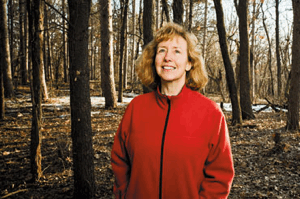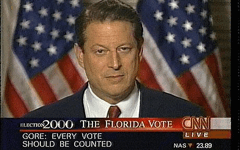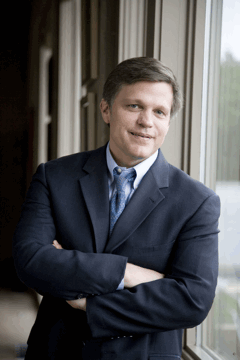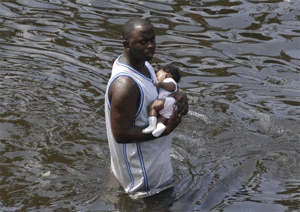Living on Earth’s Look Back
Air Date: Week of January 8, 2010
Host Jeff Young asks two environmental historians about the ecological landmarks of the past decade. Doug Brinkley, best-selling author and professor of history at Rice University is joined by Nancy Langston, environmental historian from the University of Wisconsin –Madison, who says “we've done a pretty good job of creating a nightmare decade."
Transcript
YOUNG: From the Jennifer and Ted Stanley studios in Somerville Massachusetts, this is Living on Earth. I’m Jeff Young. Today, a special program: where are we going, where have we been? We look ahead to the coming decade and how we might be living on this earth in 2020.
We start with a look back at the past decade – one fraught with fear, economic crisis and ecological decline. Time magazine dubbed it the decade from hell. Maybe. It was certainly warm. You could call it the “hot aughts”. Here are some of the numbers:
[MUSIC]
YOUNG: Average global temperatures this past decade were the highest since we’ve had devices to measure them, and global ocean temperatures in summer 2009 were the hottest ever recorded. Stable sea ice in the Arctic melted to its lowest recorded level. Greenland lost more than one and a half trillion tons of ice over the decade, and the average glacier retreated 20 feet. Worldwide emissions from burning fossil fuels went up about 30 percent. China’s emissions doubled. In 2000, CO2 concentration in the atmosphere averaged 369 parts per million. It’s now 387. Geologic records indicate this is the highest CO2 concentration in 15 million years.
[MUSIC]
YOUNG: We have two prominent scholars to help us make some sense of this past decade: Nancy Langston, an environmental historian at the University of Wisconsin.

Nancy Langston (Courtesy of University of Wisconsin-Madison News)
LANGSTON: Thanks so much; it’s wonderful to be here.
YOUNG: And Rice University historian and best selling author Douglas Brinkley.
BRINKLEY: Thank you for having me I appreciate it.
YOUNG: Well, Professors, welcome, and if you’re ready, we’re going to throw a few of the significant dates of the past ten years at you, and have a green look back.
[MUSIC]
VOICEOVER: December 13, 2000.

(Courtesy of CNN)
[ARCHIVE SOUND: “Boy, that was one hell of an election night. Mr. Gore will tell the country in person tonight that the election is over. Governor Bush will speak shortly afterwards as the soon to be 43rd president-elect”]
BRINKLEY: Well, it’s a watershed moment. Al Gore, as vice president had a very strong environmental record. In fact, I had written an article about him; he had given me all the letters he had – writing his wife when he used to go backpacking and camping. Somebody who had a natural feel for Nature, and you could not have had a more polar opposite people. Gore would have been putting the climate issue front and center. Bush believes totally in a deregulated, corporate environment.
VOICEOVER: May 16, 2001: Vice President Cheney releases his energy task force report advocating greater domestic fossil fuel production.
LANGSTON: From the very beginning of 2000, the administration was making a concerted effort to take apart three decades of strong environmental regulation.

Doug Brinkley, professor of history at Rice University.
BRINKLEY: Well, Dick Cheney, his view is if it moves shoot it, if it bubbles pull it up, and if it’s buried dig it up. The idea was extract as much as you can while you can. It’s a boom time. We’ve got a president that’s going to turn a blind eye, and in fact is encouraging a kind of unregulated free enterprise. So go for it – get it.
VOICEOVER: September 11, 2001:
[NEWS REPORTER: “…effort up there yet, now remember – Oh my god!” “My God.” “That looks like a second plane. So this looks like it is some sort of concerted effort to attack the World Trade Center that is underway.”]
BRINKLEY: There’s so many different ways to look at it, but one is this fear that we now live in, almost America’s kingdom of fear – of radiation or anthrax, and all those horrible words started seeming like a reality. So, 9/11 was the feeling that, boy, we are not getting off to a good foot.
LANGSTON: Enormous concerns about terrorism and national security. And for a while I think those concerns distracted attention from the deregulation that was underway, but they also allowed the environmental movement to begin to borrow the language of security: food security, energy security. And these new languages became critical in the ability of the environmental movement to mobilize much larger constituencies.
VOICEOVER: October 8, 2004: Kenyan forestry activist, Wangari Matthai wins the Nobel Peace Prize.
LANGSTON: I think most people in America said, “Wangari who? What are we talking about? The Green Movement in Africa?” So, I think it was incredibly valuable, not just because it brought attention to a really important reforestation movement and a movement in Africa to empower women, but it also brought attention to the fact that environmental movements are not just about protecting remote places.
VOICEOVER: Aug 29, 2005.

New Orleans. (Photo: Photographer's Mate Airman Jeremy L. Grisham, U.S. Navy)
[NEWS REPORTER: “Katrina blasted into New Orleans. The most powerful hurricane the crescent city has seen in modern history.”]
BRINKLEY: I was there in New Orleans for Hurricane Katrina and remember being on top of the building and watching the Mississippi River roar backwards in the opposite direction – the sheer power of that storm, it was almost hard to fathom.
[MAN: “And they don’t have a clue what’s going on down here, thousands of people that were stuck in attics, man, old ladies. And water up to their frickin’ neck!”]
BRINKLEY: You then had, of course, the man-made disaster on top of it. Katrina’s the low ebb of the Army Corps of Engineer’s history. The fact that the Army Corps didn’t properly build the levees and didn’t maintain it properly is one of the most horrendous engineering mistakes in American history.

Canada’s decision spurred some retailers to pull baby bottles containing BPA from some store shelves. (Photo: joker4u2nv09)
VOICEOVER: June 2006. Canadian regulators warn the common plastic ingredient, Bisphenol A is “inherently toxic.”
LANGSTON: By 2008, that Canadian concern translated into efforts by Wal-Mart, by Kmart, by other large producers to get Bisphenol A out of the water bottle supply, out of the baby bottle supply. But what I think it’s important not to miss is that Bisphenol A was synthesized as an estrogen in the 1930s, it was intended as a commercial estrogen.
For seven decades, the industry knew that this chemical acted as an estrogen, the industry knew that this chemical was a powerful carcinogen, but for seven decades with this chemical and many others the industry suppressed the empirical evidence that should have been reported to the government.
VOICEOVER: January 2008. For the first time the price of a barrel of oil tops 100 dollars. May 14, 2008. The polar bear is added to the endangered species list.
LANGSTON: Fish and Wildlife Service scientists within the agency have been trying to declare the polar bear an endangered species for years, but year after year those efforts were blocked. Oil companies feared listing would restrict access to new oil fields discovered in Alaska, 30 million acres that just happened to be prime bear habitat. The bear has become the victim of energy greed and also the victim of secrecy, not just the victim of global warming.
VOICEOVER: September 3, 2008. Alaska governor Sarah Palin accepts the Republican Party vice presidential nomination.
BRINKLEY: What was the most memorable slogan that came out of the past presidential election? It would have been Sarah Palin with “drill, baby, drill.”
[“We will drill here and drill now, and now’s when you chant ‘drill, baby, drill’! Yes!” SOUNDS OF CHEERING “Drill, baby, drill!”]
BRINKLEY: What is “drill, baby, drill?” It’s about drilling the Arctic refuge. 50 years it’s been preserved, yet a slogan like “drill, baby, drill” catches fire. People say, yeah, let’s be energy sustainable, we don’t need Middle East oil, so let’s go destroy our great Alaskan wildlife refuge. And you don’t even hear people talking about the other side. It’s just “drill, baby, drill” versus not drilling.
VOICEOVER: Jan 20, 2009. Inauguration day.
[“Preserve, protect and defend the Constitution of the United States.” “So help you God?” “So help me, God.” “Congratulations, Mr. President.” SOUNDS OF CHEERING]
BRINKLEY: Ostensibly, it was met by a big cheer by environmental groups, but it’s kind of been in a standstill position. There’s a general feeling that more can be done, that people are looking for Roosevelt-ian boldness in conservation right now, not a kind of let’s weigh the options approach. You know, to be a c or Theodore Roosevelt you have to love the land so much that you want to save it. And I think president Obama loves people. His environmental concerns are, are people being hurt, their health due to bad environment – and I think he’s very strong on things like that. But the notion of going in and doing a radical take on, the way T.R. took on the big trusts of his era. You know, there’s not a single area Theodore Roosevelt saved – 234 million acres of wild America – nobody’s today is wishing he hadn’t saved it. We’re all saying thank you. Well, it’s going be the same 100 years from now. President Obama would come in and declare the Arctic refuge a national monument – history will shine a bright smile on that act.
VOICEOVER: February 13, 2009. Congress passes the Economic Stimulus Act.
LANGSTON: One of the most powerful things that the financial meltdown taught us was that deregulation is not always a good thing. And there are times such as the 1920s and the 1950s and the 1980s and again in the first half of this decade, where the forces of deregulation really prosper. And where we see the government is really hamstrung in its efforts to protect human health, broader public health, broader public goods.
BRINKLEY: The crisis became to save banking and save Wall Street, and to save an auto industry, which could be a good thing if Ford Motor gets back on its feet, and if General Motor now is federal government ownership, there is potential for moving into – whether it’s hydrogen fuel cells or hybrids – the federal government now might be able to start weaning us off of gasoline. I mean the 20th century it was said by Jack London, it stank of gasoline. Can the 21st century not stink of it?
YOUNG: Douglas Brinkley and Nancy Langston with a look back – and we’ve put together an environmental timeline of the decade – it’s at our website LOE dot org. So, Professors – now that we’ve heard about the past ten years, like to take a crack at naming the decade?
BRINKLEY: It’s the carbon footprint decade. If global warming continues and we don’t address it history will wonder, what were these people thinking? They were given every alarm bell. It’s like fire bells going off in a theater and everybody kept sitting and watching the movie.
LANGSTON: Was this a really hellish decade? It was not as economically hellish as the 1930s, it wasn’t as militarily nightmarish as the 1940s, but environmentally I think we have done a pretty good job of creating a nightmare decade. I think we still have a chance to reverse some of the worst impacts of global warming, help nations that are going to be most threatened by global warming to adapt. But I think we stand a big chance of losing our opportunity to reverse the environmental decade of hell.
YOUNG: Nancy Langston, from the University of Wisconsin, and Rice University’s Douglas Brinkley, thank you both.
BRINKLEY: Thank you, I enjoyed it.
LANGSTON: Thanks so much, Jeff, it was a great pleasure.
[MUSIC]
YOUNG: From financial meltdowns to melting ice caps this was the decade the bills started to come due on our unsustainable habits. Will we change in the next decade? More on that with Jared Diamond just ahead. Keep listening to Living on Earth!
Links
Living on Earth wants to hear from you!
Living on Earth
62 Calef Highway, Suite 212
Lee, NH 03861
Telephone: 617-287-4121
E-mail: comments@loe.org
Newsletter [Click here]
Donate to Living on Earth!
Living on Earth is an independent media program and relies entirely on contributions from listeners and institutions supporting public service. Please donate now to preserve an independent environmental voice.
NewsletterLiving on Earth offers a weekly delivery of the show's rundown to your mailbox. Sign up for our newsletter today!
 Sailors For The Sea: Be the change you want to sea.
Sailors For The Sea: Be the change you want to sea.
 The Grantham Foundation for the Protection of the Environment: Committed to protecting and improving the health of the global environment.
The Grantham Foundation for the Protection of the Environment: Committed to protecting and improving the health of the global environment.
 Contribute to Living on Earth and receive, as our gift to you, an archival print of one of Mark Seth Lender's extraordinary wildlife photographs. Follow the link to see Mark's current collection of photographs.
Contribute to Living on Earth and receive, as our gift to you, an archival print of one of Mark Seth Lender's extraordinary wildlife photographs. Follow the link to see Mark's current collection of photographs.
 Buy a signed copy of Mark Seth Lender's book Smeagull the Seagull & support Living on Earth
Buy a signed copy of Mark Seth Lender's book Smeagull the Seagull & support Living on Earth

